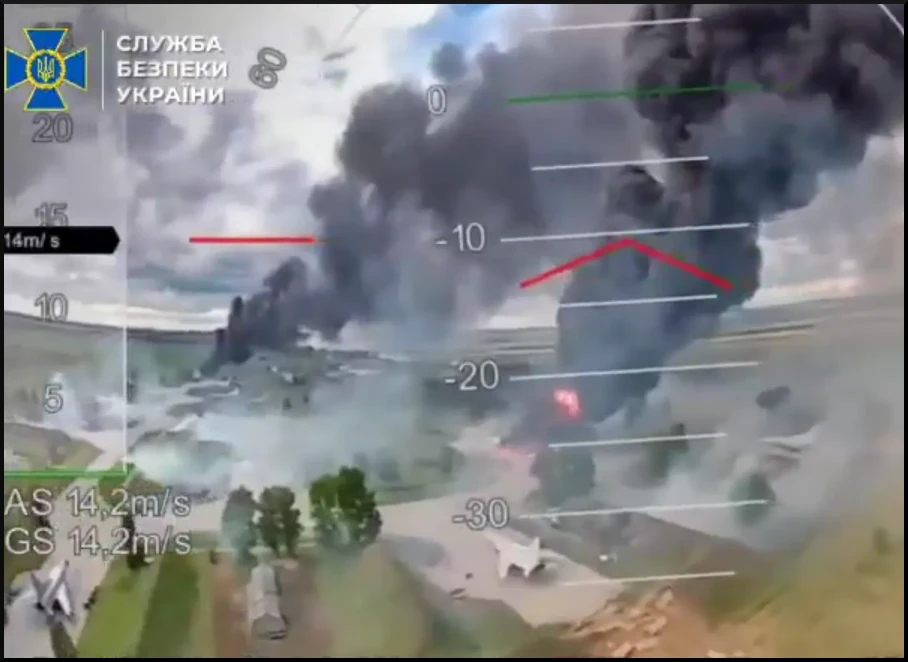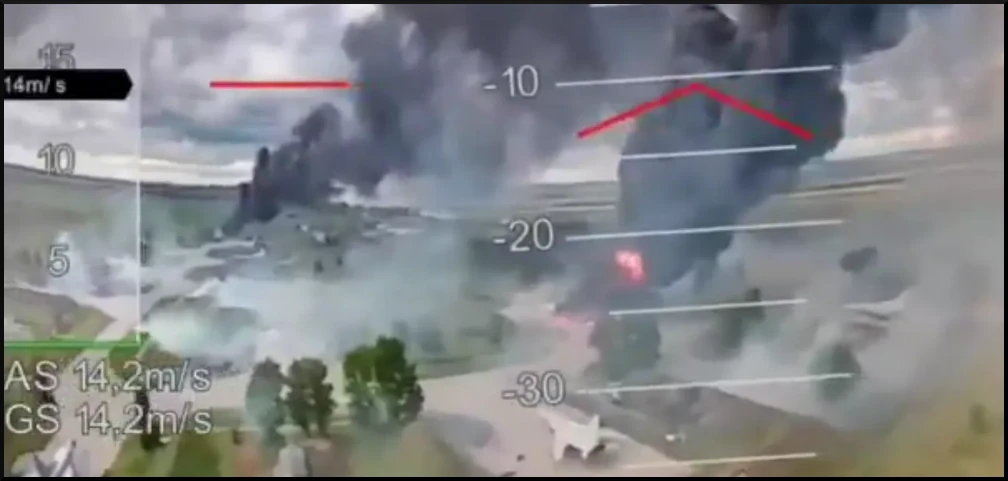by Aaron Maté, published on Substack, June 6, 2025
An audacious Ukrainian drone attack on four military bases across Russia, dubbed Operation Spider’s Web, handed Moscow one of its worst humiliations of the war. With a fleet of inexpensive drones hidden inside cargo trucks, Ukrainian intelligence penetrated deep inside Russian territory and caused significant damage to military aircraft, including long-range, nuclear-capable bombers. “The strike was a serious blow, and to suggest otherwise is self-delusion verging on sabotage,” wrote Rybar, a popular pro-Kremlin social media channel.
For Ukraine and its Western backers, the strikes reinforce their ability to inflict significant costs on Russia more than three years into an invasion that Kyiv was expected to lose within days — and bolster the case for continued US support. For Ukrainian president Volodymyr Zelensky, the images of smoldering Russian aircraft “help change the rhetoric in the US,” where it can no longer be said, as Donald Trump argued in their Oval Office showdown, that “Ukrainians are losing this war, and don’t have the cards.” Added former senior Zelensky aide Oleg Ustenko: “Trump said we don’t have the cards — this shows we do have the cards, and we can play them.”
Powerful elements in Washington would undoubtedly agree. By targeting part of Russia’s nuclear triad, “[s]ome officials said Ukraine’s drone attacks could be viewed as a gift to the United States,” the New York Times reported. Days after visiting Kyiv to promote his push for harsh sanctions on Russia’s trading partners, Republican Senator Lindsey Graham hailed Ukraine’s “ever-resourceful” effort “to successfully attack Russian bombers and military assets.”
As grateful proxy war sponsors like Graham illustrate, Ukraine had ample grounds to believe that it was handing the US a “gift.”
In March 2023, Trump’s current special envoy for Ukraine, Keith Kellogg, described the Biden administration’s policy of using Ukraine to bleed Russia as “the acme of professionalism.” Ukraine fighting Russia, Kellogg explained, “takes a strategic adversary off the table” without “using any US troops.” Now tasked with brokering an end to the war two years later, Kellogg is having second thoughts. “I’m telling you the risk levels are going way up,” Kellogg told Fox News. “When you attack an opponent’s part of their national survival system, which is their nuclear triad, that means your risk level goes up because you don’t know what the other side’s going to do.”
As Kellogg indicates, that risk extends far beyond the current battlefield. By attacking Russia’s strategic bombers on exposed tarmacs, Ukraine took advantage of Russia’s obligations under arms control treaties with the US, which call for nuclear-capable aircraft to be easily observable in satellite imagery. With US-Russia arms control already at a historic low, Ukraine’s exploitation of the last remaining treaty, New START, to strike Russian forces will further imperil new agreements. With US-Russia relations “simply in ruins,” Moscow’s top arms control official, Sergei Ryabkov, said Thursday, “there are no grounds for a full-scale resumption” of New START when it expires in February. And even if Ukraine acted alone on this operation, the fact that US and UK officials planned and oversaw earlier attacks on Russia now increases the risk that NATO assets will become future Russian targets.
Having launched the drone attack on the eve of a new round of peace talks in Istanbul, Ukraine has signaled that it has no interest in an immediate peace deal with Russia. By sticking to its maximalist demands, including annexing Ukrainian territory that it does not fully control, Moscow has signaled the same. And Donald Trump, the president who vowed to bring the Ukraine war to a speedy end, also appears to have lost interest in playing dealmaker. The Russia-Ukraine war, Trump said on Thursday, is like “two young children fighting like crazy in a park. … Sometimes, you’re better off letting them fight for a while and then pulling them apart.”
Trump also seems resigned to a devastating Russian counterattack. Following a phone call with Russian counterpart Vladimir Putin, Trump passively noted that theirs was “not a conversation that will lead to immediate peace,” and that Putin had insisted, “very strongly, that he will have to respond to the recent attack.”
Despite losing valuable assets in the drone operation, Russia maintains a military advantage over its smaller neighbor, particularly on the ground, where it continues to slowly absorb more Ukrainian territory. As one senior US official noted, while the Ukrainian drones may have caused “significant” damage, “the attack alone would not force Russia to scale back its offensive operations inside Ukraine.” If current trends hold, a recent Pentagon intelligence assessment concluded, the war “probably will continue to slowly trend in Russia’s favor through 2025.”
If anything, the attack will motivate Russia to scale up its offensive attacks in Ukraine, making the prospect of near-term peace even more remote. With a negotiated solution off the table anytime soon, the immediate question hanging over the Russia-Ukraine war is now whether its growing dangers can be contained. If not, the Ukraine-Russia war is increasingly heading down a path wherein a future “Spider’s Web” ensnares us all.
*Featured Image:

Aaron Maté is a journalist and producer. He hosts Pushback with Aaron Maté on The Grayzone and Useful Idiots. In 2019, Maté was awarded the Izzy Award (named after I.F. Stone) for outstanding achievement in independent media for his coverage of Russiagate in The Nation magazine. Previously, he was a host/producer for The Real News and Democracy Now!.
